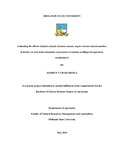Please use this identifier to cite or link to this item:
https://cris.library.msu.ac.zw//handle/11408/2534| Title: | Evaluating the effects of plant extracts (lantana camara, tagetes minuta and amaranthus hybridus) on root knot nematodes (m.javanica) in tomato seedlings (lycopersicon esculentum l) | Authors: | Chakuringa, Darryn T. | Keywords: | Root Knot Nematodes | Issue Date: | May-2016 | Publisher: | Midlands State University | Abstract: | Root Knot Nematodes are one of the major economically important pests of tomato (Lycopersicon esculentum L) in many regions of the world including Zimbabwe, with Meloidogyne javanica being considered the most destructive. Recent prohibition of main soil chemical fumigants for the control of Meloidogyne javanica has prompted for the search of other alternatives to manage root knot nematodes. A greenhouse experiment was carried out to evaluate the effects of aqueous plant extracts on (Lantana camara, Tagetes minuta and Amaranthus hybridus) with a negative and positive control where negative control had only water and positive control had a chemical nematicide (Nemacur®400 Ec (fenamophos as the active ingredient) on Root Knot Nematode (Meloidogyne Javanica) suppression in tomato seedlings. The experiment was arranged in a Completely Randomised Design (CRD) with five treatments and three replications. A Meloidogyne Javanica inoculum was obtained from Tobacco Research Board (TRB) and botanical plant leaves were obtained locally and aqueous plant extracts were prepared. Data collected were days to 50% emergence, seedling height, final nematode population density, gall density and index and root: shoot ratio. There was a significant difference (P<0.001) between the control, Nemacur and all the botanical treatments though A.hybridus showed no significant difference from control on final nematode population density, final RKN population density, number of galls and improved growth parameters of tomato seedlings. The chemical properties and compounds found in the botanicals, for example phenolic and caffeic acids might be responsible for the effects of RKN on tomato seedlings. Results suggest that application of L.camara and T.minuta leaf extracts are good alternatives to manage RKN population though they have an inhibitory suppressive effects on growth parameters | URI: | http://hdl.handle.net/11408/2534 |
| Appears in Collections: | Bsc Agronomy Honours Degree |
Files in This Item:
| File | Description | Size | Format | |
|---|---|---|---|---|
| darryn .pdf | Full Text | 945.89 kB | Adobe PDF |  View/Open |
Page view(s)
300
checked on Feb 10, 2026
Download(s)
272
checked on Feb 10, 2026
Google ScholarTM
Check
Items in MSUIR are protected by copyright, with all rights reserved, unless otherwise indicated.



